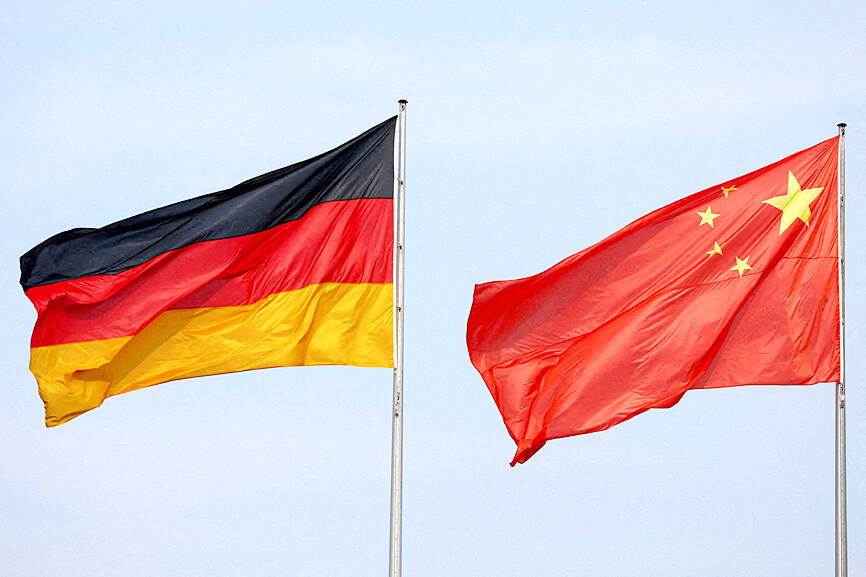Germany is considering scaling back plans to ramp up government screening of Chinese investments, the Wall Street Journal said.
A decision to ease back from a planned foreign investment screening law had become likelier due to fears that scrutiny on Chinese investments could hurt Berlin’s efforts to revitalize Germany’s economy, the report said, citing unidentified people familiar with the plan.
The plan for the bill proposed giving the government powers to screen foreign investments for security risks, a German Ministry for Economic Affairs and Climate Action paper seen by the Wall Street Journal said.

Phot: Reuters
The bill would allow the government to review new types of greenfield investments, including quantum technology, sophisticated semiconductors, artificial intelligence and critical infrastructure, the Wall Street Journal reported, citing the ministry’s paper.
The government also sought to include a provision that would allow the screening of cooperation projects between German research institutions and foreign partners in critical areas.
No final decision on the plan has been made, but “both ideas will likely be dropped,” the report said.
A German government spokesperson declined to give a comment to the Wall Street Journal on the deliberations, but said: “Investment screening is designed to avoid risks to security and public order in Germany. At the same time, it is important to remain open to foreign investments.”
The country needs an economic turnaround in order to secure its geopolitical position, German Minister of Finance and Free Democratic Party head Christian Lindner said on Saturday last week.
In its World Economic Outlook report, the IMF cut its forecasts for German GDP by 0.3 percentage points for both years.
It is expecting 0.2 percent growth this year and 1.3 percent next year, the IMF report said.
These forecasts are below the estimates of 0.8 percent for this year and 1.5 percent for next year for the eurozone, showing that Germany has become a laggard in the bloc.
It was also the only major economy to suffer a contraction last year.
Lindner said Germany’s economic weakness has consequences for security and geopolitics.
“We need the economic turnaround, because in the end, economic strength is also a factor in geopolitics,” Lindner said at Additional reporting by Reuters

Taiwan’s long-term economic competitiveness will hinge not only on national champions like Taiwan Semiconductor Manufacturing Co. (TSMC, 台積電) but also on the widespread adoption of artificial intelligence (AI) and other emerging technologies, a US-based scholar has said. At a lecture in Taipei on Tuesday, Jeffrey Ding, assistant professor of political science at the George Washington University and author of "Technology and the Rise of Great Powers," argued that historical experience shows that general-purpose technologies (GPTs) — such as electricity, computers and now AI — shape long-term economic advantages through their diffusion across the broader economy. "What really matters is not who pioneers

In a high-security Shenzhen laboratory, Chinese scientists have built what Washington has spent years trying to prevent: a prototype of a machine capable of producing the cutting-edge semiconductor chips that power artificial intelligence (AI), smartphones and weapons central to Western military dominance, Reuters has learned. Completed early this year and undergoing testing, the prototype fills nearly an entire factory floor. It was built by a team of former engineers from Dutch semiconductor giant ASML who reverse-engineered the company’s extreme ultraviolet lithography (EUV) machines, according to two people with knowledge of the project. EUV machines sit at the heart of a technological Cold

TAIWAN VALUE CHAIN: Foxtron is to fully own Luxgen following the transaction and it plans to launch a new electric model, the Foxtron Bria, in Taiwan next year Yulon Motor Co (裕隆汽車) yesterday said that its board of directors approved the disposal of its electric vehicle (EV) unit, Luxgen Motor Co (納智捷汽車), to Foxtron Vehicle Technologies Co (鴻華先進) for NT$787.6 million (US$24.98 million). Foxtron, a half-half joint venture between Yulon affiliate Hua-Chuang Automobile Information Technical Center Co (華創車電) and Hon Hai Precision Industry Co (鴻海精密), expects to wrap up the deal in the first quarter of next year. Foxtron would fully own Luxgen following the transaction, including five car distributing companies, outlets and all employees. The deal is subject to the approval of the Fair Trade Commission, Foxtron said. “Foxtron will be

INFLATION CONSIDERATION: The BOJ governor said that it would ‘keep making appropriate decisions’ and would adjust depending on the economy and prices The Bank of Japan (BOJ) yesterday raised its benchmark interest rate to the highest in 30 years and said more increases are in the pipeline if conditions allow, in a sign of growing conviction that it can attain the stable inflation target it has pursued for more than a decade. Bank of Japan Governor Kazuo Ueda’s policy board increased the rate by 0.2 percentage points to 0.75 percent, in a unanimous decision, the bank said in a statement. The central bank cited the rising likelihood of its economic outlook being realized. The rate change was expected by all 50 economists surveyed by Bloomberg. The